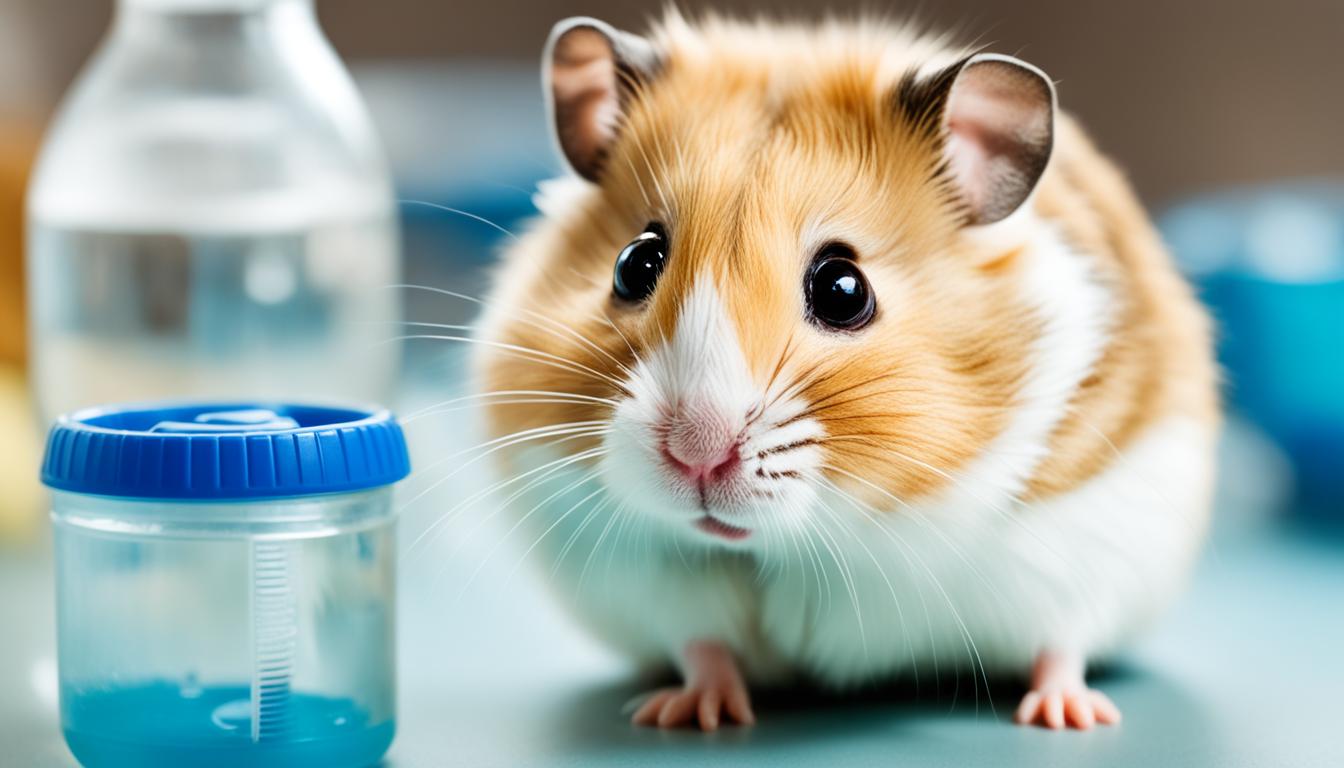To care for a nocturnal hamster, you should create a quiet, dim environment during the day and provide plenty of enrichment to keep it active at night. Use cozy bedding for burrowing, offer a balanced diet with fresh vegetables and protein treats, and guarantee clean, well-ventilated housing. Handle gently during its active hours and watch for natural behaviors like digging. If you want to learn more tips for a happy, healthy nocturnal hamster, keep exploring these essential care steps.
Key Takeaways
- Provide a quiet, dimly lit environment during the day to mimic natural sleep cycles.
- Offer enrichment like tunnels, chew toys, and exercise wheels to stimulate natural behaviors.
- Maintain a high-quality pellet diet supplemented with fresh vegetables and occasional protein treats.
- Handle your hamster gently during its active period to prevent stress and promote trust.
- Keep bedding suitable for burrowing, such as paper-based material or aspen shavings, and clean regularly.

If you have a nocturnal hamster, understanding its natural habits is vital for providing proper care. These little creatures are most active during the night, which means their routines differ markedly from diurnal pets like mice or gerbils. Recognizing their natural behaviors helps you create an environment that keeps them healthy and stress-free. One important aspect to focus on is diet considerations. Nocturnal hamsters require a balanced diet that supports their energy needs during their active hours. Offer a high-quality pellet mix as the foundation of their diet, supplemented with fresh vegetables, small amounts of fruit, and occasional protein treats like boiled eggs or mealworms. Avoid overfeeding sugary treats, as these can lead to obesity and health issues. Keep fresh water available at all times, ideally in a water bottle with a sipper tube to prevent messes and contamination. Providing appropriate enrichment is also crucial, as it helps simulate their natural environment and prevents boredom. Providing natural behaviors through enrichment activities encourages mental stimulation and reduces stress. Additionally, incorporating various textures and materials in their environment can promote natural digging and foraging behaviors. Bedding options also play a vital role in their well-being. Since hamsters are burrowers by nature, choose bedding that allows for digging and nesting. Soft, absorbent materials like paper-based bedding or aspen shavings work well because they are safe, dust-free, and easy to clean. Avoid cedar or pine shavings, as the aromatic oils can be harmful to small animals. Regularly changing the bedding not only keeps the cage clean but also reduces odors and the risk of infections. Providing enough bedding encourages natural behaviors like burrowing and nesting, which are essential for mental stimulation. If you notice your hamster digging or creating tunnels, it’s a good sign that you’ve chosen appropriate bedding options that cater to their instincts. Since nocturnal hamsters are most active at night, you’ll want to set up their environment to accommodate their schedule. Keep their cage in a quiet, dimly lit area during the day to mimic their natural resting environment, but ensure they have a stimulating space at night. Including a variety of chew toys, tunnels, and exercise wheels can help keep them physically and mentally engaged. For optimal health and safety, make sure the habitat is well-ventilated, as proper airflow reduces the risk of respiratory issues. Be mindful of noise levels and disturbances during their active hours; loud sounds or bright lights can stress them out. If you’re handling your hamster during the day, do so gently and in a calm environment to avoid disrupting their natural rest cycle. Creating a well-balanced environment tailored to their nocturnal habits helps guarantee your hamster remains healthy, active, and happy. Additionally, regular bulb maintenance, such as cleaning filters and replacing worn-out bulbs, can ensure their habitat remains safe and comfortable.
Frequently Asked Questions
Can Nocturnal Hamsters Sleep During the Day Without Stress?
No, your nocturnal hamster can sleep during the day without stress if you create a calm environment. Make certain their cage is quiet, dark, and away from disturbances, which encourages natural daytime sleep. Avoid sudden noises or bright lights that can disrupt their rest. Providing a cozy hiding spot helps reduce stress and promotes peaceful daytime sleep. By respecting their natural rhythms, you help keep your hamster healthy and stress-free.
What Is the Ideal Temperature for a Nocturnal Hamster’S Habitat?
You should maintain an ideal temperature of about 65-75°F for your nocturnal hamster’s habitat. Proper temperature regulation helps keep your hamster comfortable and stress-free. Use appropriate bedding materials like aspen or paper-based bedding to insulate and maintain stable temperatures. Avoid drafts and direct sunlight, as fluctuations can cause stress or health issues. Keeping the environment consistent guarantees your hamster stays healthy and active during its nocturnal hours.
How Do I Introduce a New Hamster to an Existing Nocturnal Colony?
When introducing compatibility in a hamster colony, you should start by observing their behaviors and gradually introducing them in neutral territory. Keep an eye on colony dynamics and watch for signs of aggression or submission. Use a slow, supervised process, ensuring each hamster feels safe. This helps prevent conflicts, encourages peaceful coexistence, and creates a harmonious environment for your nocturnal hamsters to thrive together.
Are Nocturnal Hamsters More Prone to Certain Health Issues?
Did you know nocturnal hamsters are slightly more prone to health issues? They may develop diet deficiencies if their diet isn’t balanced or suffer from respiratory infections due to limited ventilation during their active hours. You can help prevent these problems by providing a nutritious, varied diet and ensuring good airflow in their habitat. Regular vet checkups also catch issues early, keeping your nocturnal hamster healthy and happy.
What Toys or Enrichment Are Best for a Night-Active Hamster?
You should provide your nocturnal hamster with toys and enrichment that keep it active and engaged. Treat puzzles are perfect, encouraging mental stimulation and rewarding its natural foraging instincts. Chew toys also help keep its teeth healthy and prevent boredom. Rotate these items regularly to maintain interest, and guarantee the toys are safe and suitable for small animals. This way, your hamster stays happy, healthy, and mentally active during its nighttime adventures.
Conclusion
So, now that you’ve mastered the art of caring for your tiny night-time ninja, remember: it’s all about patience. Let your hamster run wild when the moon rises, and don’t expect a full-night Netflix binge—your little nocturnal buddy has other plans. Embrace the chaos, enjoy the midnight chaos, and maybe, just maybe, you’ll sleep again someday. After all, who needs sleep when you have a hamster that parties when you’re asleep?










